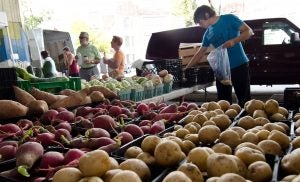Leaders in 22 states spoke up after the USDA wanted SNAP benefits to better address sexual orientation and gender inclusion
In early May 2022, the U.S. Department of Agriculture announced that it will interpret the prohibition on sex discrimination found in Title IX and the Food and Nutrition Act of 2008 to include discrimination based on sexual orientation and gender identity. States that do not also enact these changes may be subject to a loss of funding for their state agencies.
Shortly after in June, 22 state attorneys general filed lawsuits against the USDA.
Their argument challenges the federal government, sharing that these directions hadn’t been passed through Congress prior to being enacted and passed along to the states. According to Ohio Attorney General Dave Yost’s website, the attorneys general also argue that the policies are an illegal mandate for the following reasons:
- “They were issued without providing states and other stakeholders the opportunity to provide input, as required by the Administrative Procedures Act.”
- “The USDA premised its guidance on an obvious misreading and misapplication of the Supreme Court’s holding in Bostock v. Clayton County, which expressly disclaimed the decision’s application to “other federal or state laws that prohibit sex discrimination.”
- “The guidance imposes new and unlawful regulatory measures on state agencies and operators that receive federal financial assistance from the USDA — which will inevitably result in regulatory chaos that threatens essential nutritional services to some of our most vulnerable citizens.”
However, is it that the federal government (or, more specifically, the USDA) is creating an illegal mandate or are they marching forward to take their first bite of the mountain of systemic inequity for the LGBTQ+ community in both their actions and policies.

According to researchers associated with the peer-reviewed journal BMC Public Health, folks who are part of the LGBTQ+ community are the most grossly understudied population when it comes to food insecurity.
The researchers’ national survey concluded that 76 percent of people who identified as bisexual were food insecure. Fifty-two percent of female sexual minorities are food insecure, and 44 percent of this population are more likely to report they use SNAP benefits compared to their heterosexual counterparts.
Of those surveyed who identified as gay, 9.1 percent reported they received SNAP benefits. Those who identified as lesbian, 17.4 percent. Those who identified as bisexual, 22.8 percent. (For more information and statistics on food insecurity statistics among the LGBTQ+ community, visit BMC Public Health.)
Researchers at BMC Public Health concluded from the research that there is a need to include sexual orientation in nationally representative federal food security measures to ensure access to food benefit programs are widely available for these populations and that they are intentionally advertised.
As spoken about in a previous column of mine, the USDA has a lot of work ahead to amend systemic issues from previous decades and dating back to the time of its creation (see Perspective: The Emergency Relief for Farmers of Color Act: Why we need it and how to support for more context).
The 22 strong voices of the attorneys general is a tough fight to go up against, while also considering that there isn’t current legislation backing up the federal government’s desires to amend state agencies’ policies. However, there are two conflicting forces going at one another — the attorneys general and the USDA Equity Commission.
“If we don’t start to do something that people can see, then trust will never happen in the USDA,” Deputy Ag Secretary Dr. Jewel Bronaugh shared with us this past March on AGDAILY, promising to enact change within the USDA to build back trust from the most vulnerable and underserved populations of the United States. Those populations include folks from all gender and sexual orientations.
On Feb. 28, 2022, the USDA Equity Commission debuted its committee and discussed its purpose as well as steps toward mending trust amongst vulnerable and underserved populations. The committee is led by Bronaugh and fellow co-chair Arturo S. Rodriguez. Rodriguez, and the research collected from the individuals on the committee, would have definitely had an influential hand in procuring the federal government’s advice to move toward more inclusive diction in their state agency policies.

Research doesn’t lie. There is a need for more continual outreach and support to our LGBTQ+ communities to receive SNAP benefits, and a big step toward reaching that goal is ensuring that all of our states have policy in place that reflects who these communities are, just as their heterosexual counter parts do.
This community is going through real challenges in the area of food insecurity, as the research reflects, and our representatives must keep that perspective in their mind as they represent each population in their state.
“USDA is committed to administering all its programs with equity and fairness, and serving those in need with the highest dignity. A key step in advancing these principles is rooting out discrimination in any form — including discrimination based on sexual orientation and gender identity,” Secretary of Agriculture Tom Vilsack shared after the announcement of their language change policy. “At the same time, we must recognize the vulnerability of the LGBTQI+ communities and provide them with an avenue to grieve any discrimination they face. We hope that by standing firm against these inequities we will help bring about much-needed change.”
It’s easy to remain tied to our own narratives and experiences, imparting our own experiences onto others we serve. But let’s be real, that’s not the world we live in. We live in a beautiful, diverse, and unique country full of people with so much potential to impart inclusive and loving change into our communities. The more we push back on it, the harder it will be for us to create change and unify our nation.
Imagine what we can do by making small changes, such as amending policies to reflect everyone’s lived experience.
Bre Holbert is a past National FFA President and studied agriculture science and education at California State-Chico. “Two ears to listen is better than one mouth to speak. Two ears allow us to affirm more people, rather than letting our mouth loose to damage people’s story by speaking on behalf of others.”



